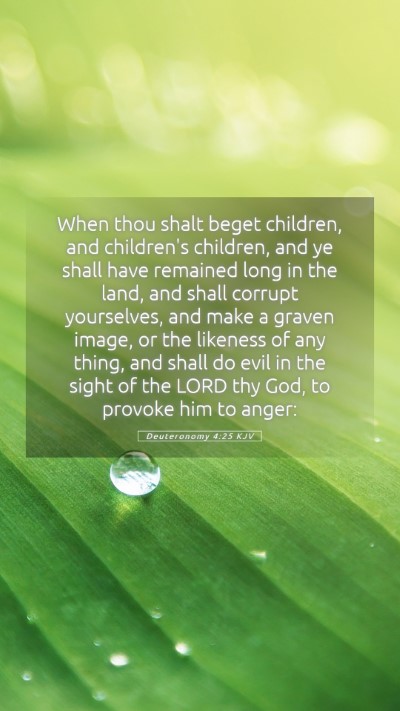Understanding Deuteronomy 4:25 - A Comprehensive Bible Verse Commentary
The verse Deuteronomy 4:25 states:
"When thou shalt beget children, and children's children, and ye shall have remained long in the land, and shall corrupt yourselves, and make a graven image, or the likeness of any thing, and shall do evil in the sight of the Lord thy God, to provoke him to anger."
This verse warns the Israelites about the consequences of turning away from God and engaging in idolatry. Let's delve into the Bible verse meanings and explore insights from renowned public domain commentaries to gain a deeper understanding of Scripture.
Contextual Background
Deuteronomy is part of the Pentateuch, attributed to Moses, where he reiterates the Law to the Israelites on the brink of entering the Promised Land. This chapter reflects Moses’ concern about Israel's future fidelity to God.
Commentary Insights
Matthew Henry's Commentary
Matthew Henry emphasizes the importance of this verse as a solemn warning to future generations. He points out that the act of "corrupting" oneself is a gradual decline, often initiated by complacency after receiving God's blessings. Henry notes:
- Generational Accountability: Every generation is accountable to uphold God's commandments to avoid provoking His anger.
- Idolatry’s Consequences: Making graven images represents a gravely sinful act that leads to divine judgment.
Albert Barnes' Notes
Albert Barnes provides further insights into the implications of idolatry in this context:
- Prolonged Residence in the Land: The mention of remaining long in the land signifies the blessings of stability, which comes with a warning against apathy and moral decay.
- The Nature of Evil: Barnes clarifies that doing evil in the sight of God is not only about actions but also the attitude of the heart.
Adam Clarke’s Commentary
Adam Clarke offers a theological perspective about the nature of God’s covenant and Israel's responsibilities:
- Covenantal Relationship: Clarke stresses that Israel’s relationship with God is based on obedience, and turning to idols denotes a breach of covenant.
- Significance of Warning: This warning serves as a prophetic note to the impending disobedience Israel would face in later generations.
Thematic Analysis
The major themes surrounding Deuteronomy 4:25 include:
- Idolatry: The destructive nature of idolatry is underscored as it leads to a departure from true worship.
- Generational Responsibility: Each generation bears the responsibility of teaching and living out the truths of God’s Word.
- God's Jealous Nature: Understanding God’s anger towards idolatry highlights His commitment to exclusive worship.
Application of the Verse
In applying the teachings of Deuteronomy 4:25, believers today can reflect on:
- The Importance of Vigilance: Maintaining a heart aligned with God’s will and avoiding distractions that lead to spiritual corruption.
- Teaching the Next Generation: Emphasizing the significance of imparting faith and righteousness to children and youth.
- Recognizing Modern Idols: Identifying what constitutes idolatry in contemporary life, whether it be materialism, success, or self-worship.
Bible Study Insights
For those engaged in Bible study groups or online Bible study, this verse serves as an excellent topic for discussion:
- How to Interpret Bible Verses: Explore methods of interpreting Scripture in light of historical context.
- Understanding Difficult Bible Passages: Discuss how warnings in Scripture can help guide moral living today.
- In-Depth Bible Verse Analysis: Encourage comprehensive study of each component of the verse to grasp its full meaning.
Related Cross References
This verse relates to other Scriptures, enhancing its understanding:
- Exodus 20:4-5: The command against idolatry and the consequences of worshiping graven images.
- Deuteronomy 8:11: A warning to remember and keep the commandments to avoid corruption.
- 1 Corinthians 10:7: The New Testament perspective on idolatry and its implications for believers.
Conclusion
Deuteronomy 4:25 serves as a powerful reminder of the significance of faithfulness to God across generations. Understanding this verse through thorough Bible verse interpretations enables believers to avoid spiritual decline and to remain vigilant in their worship. By reflecting on these insights, individuals can strengthen their relationship with God and encourage others to do the same.


